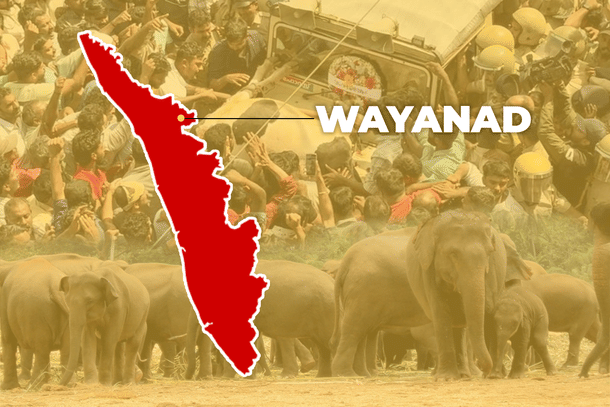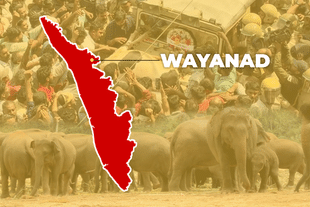Kerala
On Wildlife, Kerala Should Shun Conflict And Choose Cooperation With Neighbours
S Rajesh
Feb 21, 2024, 02:07 PM | Updated 02:07 PM IST
Save & read from anywhere!
Bookmark stories for easy access on any device or the Swarajya app.


Kerala's Wayanad district has seen a number of protests regarding the issue of man-animal conflict after multiple incidents of humans being attacked and killed by elephants in the past few weeks.
Locals have accused the Forest Department officials of negligence and not issuing early warnings, which could have prevented the deaths.
Along with an announcement of compensation, the Kerala government has said that it would take measures to safeguard people from such attacks.
Vellachalil Paul, an employee of an eco-tourism centre of the Forest Department, died on 16 February after being attacked by a herd of elephants. Earlier, a farmer named Ajeesh Joseph Panachiyil was killed by an elephant on 10 February. The elephant had entered a village near Mananthavady.
Prior to these two incidents, another man named Lakshmanan, who belonged to a tribal community, was killed at Tholpetty on 30 January.
The Congress government in Karnataka announced a compensation of Rs 15 lakh to the family of Ajeesh, after a visit by Rahul Gandhi, who is the MP from Wayanad, on the grounds that the elephant was radio-collared and released by Karnataka.
While questions have been raised as to whether it was appropriate for the Karnataka government to do so, with B Y Vijayendra, the state president of the Karnataka unit of the Bharatiya Janata Party (BJP) saying that it was being done to please Rahul Gandhi, the incident is a reminder that wildlife knows no borders.
A shared effort by neighbouring states to mitigate man-animal conflict becomes even more important in the case of Wayanad, which is located at a tri-junction of Kerala, Tamil Nadu and Karnataka.
There are a number of major wildlife reserves in the region — Wayanad Wildlife Sanctuary in Kerala, Mudumalai National Park in Tamil Nadu and the Bandipur National Park in Karnataka and the animals, especially elephants, are known to traverse across the three states.
Issues Causing Man-Animal Conflict In Wayanad
According to an article in The Indian Express, which cited a 2018 study by the Wildlife Institute of India (WII) and Periyar Tiger Conservation Foundation, the main reasons for the recent conflicts are the decline in quality of forest habitats, chiefly due to the cultivation of alien species like acacia and eucalyptus and the changing nature of agriculture practices, ie, farms being unattended, and a shift towards animal husbandry.
Farms with crops like bananas and pineapples and cattle, especially in areas bordering forests, are easy targets for wild animals.
The increase in attacks has also driven human settlements farther away.
What Has The Kerala Government Been Doing
Among the steps taken by the state government are the construction of trenches, stone walls and fencing. Rapid response teams have been established. It is also undertaking eco-restoration programmes under which indigenous species are planted to ensure food security for the animals and land is acquired from farmers to be turned into forests.
The Kerala Assembly recently passed a resolution asking the Centre to amend the Wildlife Act to allow Chief Conservators of Forests instead of the Chief Wildlife Warden to decide on the killing of wild animals posing a threat to human life.
The state government also wants wild boars to be declared as 'vermin' so that people could hunt them down.
Earlier Steps To Address It
While not directly relating to wildlife, two well known committees — the Gadgil committee and Kasturirangan committee — had recommended creation of eco-sensitive zones in the Western Ghats region, where there would be restrictions on human activities. Both reports saw widespread opposition, especially in Kerala.
Role Of The Church
The Kerala Catholic Bishops Council had protested against the recommendations of both committees. Even in the current issue, it is protesting against the government.
Archbishop Mar Joseph Pamplany of the Syro-Malabar Church, who came into the limelight last year after his comments stating that Christians would vote for the BJP if the Centre increased rubber prices to Rs 300 per kilogram, said that protests would continue until the issue is resolved.
Cooperation, Not Conflict Is The Way Forward
While measures must be taken to prevent further deaths unlike the unfortunate ones of Paul, Ajeesh and Lakshmanan, such unfortunate events should also act as a wake up call for the people of Wayanad and the Kerala government to eschew the path of conflict with neighbouring states and instead choose cooperate with them on the issue of wildlife.
For example, on the issue of the night-traffic ban through the Bandipur National Park.
The issue had resurfaced recently after the death of an elephant that was hit by a truck and the Kerala government's survey for a proposed railway line between Nilambur in Kerala and Nanjangud in Karnataka via Wayanad.
Like human lives, the life of animals is also important.
The Karnataka government has been generous this time by granting compensation, (whether it is because of the Rahul Gandhi connection is secondary), but Kerala must also do its bit on Bandipur.
S Rajesh is Staff Writer at Swarajya. He tweets @rajesh_srn.





